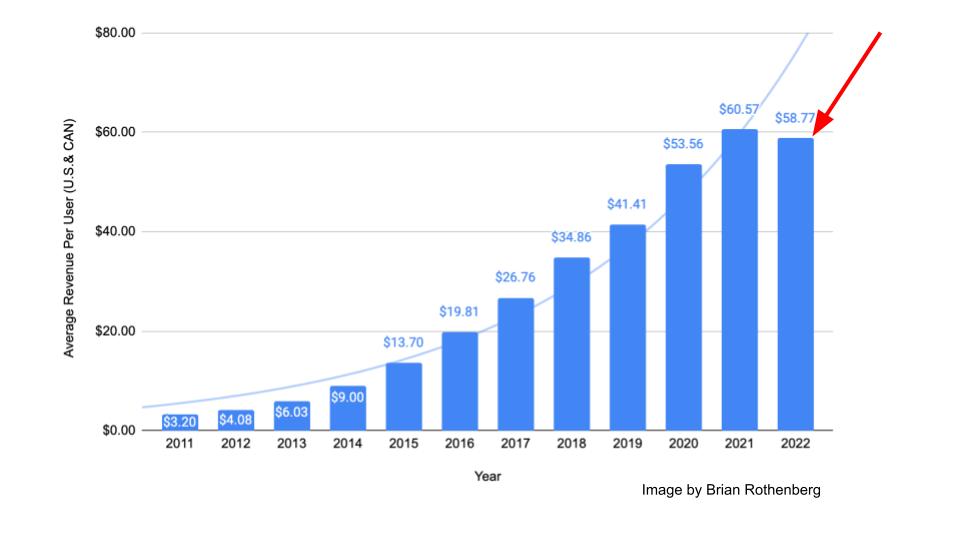Brian Rothenberg
More posts from Brian Rothenberg
From 2011 to 2021, Facebook’s average revenue per user (ARPU) shot up at a nearly exponential rate. Companies across every sector were paying more per “eyeball” than ever as customer acquisition costs (CAC) rose at an unsustainable rate.
I shared this observation a couple years ago, predicting that startups would start to better scrutinize and reel in their spending:
Facebook's revenue per user is growing almost exponentially in US/CAN.
Marketers are paying more per "eyeball" than ever. Many startups are spending unsustainably.
2019 prediction: approaching a recession, VCs scrutinize & co's cut spend (which many should have done sooner). pic.twitter.com/hd5Mg9dLI6
— Brian Rothenberg (@bmrothenberg) January 3, 2019
My timing was off by three years, but we’re finally seeing this play out. For the first time on record, in 2022, Meta’s ARPU actually declined from a year earlier in the U.S. and Canada.

I spent most of the last decade as a startup operator, working through these challenges leading growth at my startup, then at TaskRabbit and Eventbrite as VP of growth and as a growth adviser. Now, as an early-stage investor, I spend much of my time helping companies navigate and chart their own growth paths.
Advertising costs had risen for nearly my entire operating career, so I biased heavily toward developing scalable organic channels and building in-product growth loops. But as a founder during the Global Financial Crisis and subsequent recession, I learned how a broad market pullback in online ad spending can create opportunities for startups willing to double down when others are running for the exit.
At my prior startup, we worked to build a growth engine of unique, user-generated content that fueled organic SEO growth and experimented across Google, Facebook and other paid online channels. This let us find channels and tactics that drove compelling CACs, and we used this spending during that downturn to ramp up our early user base more quickly. We also learned faster by having more people using our product than we otherwise would have.
Fast-forward to today: Against the backdrop of inflation, the stock market in 2022 saw its worst drop since 2008, and companies are laying people off while tightening their purse strings. Ad spending is one of the first areas to be cut, which is why we saw the first pullback in Meta’s ARPU in more than a decade.
It sounds gloomy because it is so. But for opportunistic companies, there’s a silver lining: Now is a great time to go on offense.
During a recent board meeting at a startup, our eyes widened when we saw their paid CAC had dropped to the single digits. Their payback was immediate for each new customer they acquired (as a benchmark, immediate payback is “exceptional”). A good portion of the ensuing conversation revolved around the CEO’s question: “Should we invest more aggressively in this acquisition opportunity despite the broader market challenges?”
I’ve since had similar conversations with other companies, and while each situation is unique, I wanted to share my high-level advice:
Five ways to strategize paid marketing in a downturn
1. Consider if paid marketing is the right investment for you right now
Ask yourself: “Is paid marketing really the place to invest our precious cash when we factor in the new reality of our cost of capital?”
Capital is more expensive now than it’s been in years. Where else can you invest to drive higher returns and to build a more durable competitive advantage?
It’s important to recognize that paid advertising is arbitrage: You pay to acquire a customer for less than their value. While the current downturn is driving ad costs lower, presenting a near-term opportunity, this spread is shrinking over the medium term as competition increases and as the dominant platforms (Meta, Google and the like) squeeze more money out.
Hence, over the long run, arbitrage tends to trend toward zero. This is another reason why a solid organic distribution advantage is a must.
2. Organic growth is better than paid growth
If your company doesn’t have the resources to invest in both organic and paid channels, it’s usually best to prioritize investments in organic channels (content, SEO, product-led growth, etc.) even though it’s often much faster to drive results via paid marketing.
I can’t think of many recent examples of category-leading companies that built their leadership position on the back of paid marketing without one or more strong organic channels as well. Doing what your competition is doing, just better or harder, rarely leads to winning a market.
You have to find ways to do things differently. Given that most of your competition will be using paid marketing, the chances of you outdoing them in these same channels is low. You need to find and invest in organic channels where you have some advantage as well.
3. Focus on payback period instead of LTV/CAC
If you are going to ramp up paid marketing, you need to recognize that cash cycles are important. And they matter even more today, when funding is tighter and even the best companies are facing more dilution for less money.
My friend Dan Hockenmaier at Faire summarized this well: “This is why payback period is a better measure of customer acquisition efficiency than LTV/CAC: LTV is blind to speed, but speed is half the battle.”
Another commenter on this thread also shared a great perspective: “A shorter CAC payback period lowers working capital requirements and can produce positive outcomes like faster growth and lower dilution. A long CAC payback period is potentially deadly since it consumes what is like oxygen for a business: cash.”
Payback is a better measure of efficiency given that it is also more grounded in fact than LTV, which is just a guess for most early startups.
4. Closely monitor marginal CAC not just average CAC.
If you do ramp up your paid marketing spending, be aware that acquiring your next 100 customers via paid marketing will likely cost you more and they will likely be worth less than the last 100 customers you acquired.
Why? Using an extreme example, it’s generally cheapest to find your first paying customer. Odds are, if they found you so early, they really need your product, which makes them probably worth a lot more: They’re willing to pay more, and they’re likely to keep using your product for longer.
But as you scale further into your potential customer base, each subsequent customer generally becomes more expensive to reach. Channels become saturated, your targeting has already found the low-hanging fruit with the lowest CPAs and so on. Finding your next marginal customer almost always costs more.
Does that one-millionth customer who found you via a paid ad really need your product as much as your one-hundredth customer who heard about you via a raving referral from a friend? Not likely, which means the former is more likely to have a lower LTV and be worth less.
Given this dynamic, if you do ramp up your paid marketing spending, it’s critical to closely monitor your marginal CAC and not only your average CAC. Averages can be misleading and if you get into a situation where you have a significantly higher marginal CAC with a lower-value customer, your payback period may end up being much longer than anticipated.
Or worse, you could even find your marketing spending to be entirely upside down and unprofitable.
5. Try to recoup paid marketing CAC in the first month
Spending up to the point where marginal CAC is equal to your first-month payback is usually a pretty safe place to be.
My advice to most startups is that if they can recoup their paid marketing CAC in the first month, they should do that all day. Beyond that, it’s largely dependent on the type of business and the unique situation that each company is in with respect to cash balance, access to additional capital, other areas of investment opportunity and more.
You might be wondering how I answered the company’s questions above. My advice was to invest more aggressively in paid marketing up to at least a point where marginal CAC is equal to first-month payback. As that company is a consumer business, we were okay investing up to a three-month payback period, which is still considered to be great.
I advised them to closely and continuously measure not only average CAC, but marginal CAC as they ramp up spending, as it will change over time. The company also had the resources and runway to continue to invest in their owned organic channels, and we told them to continue prioritizing organic over paid marketing despite having lower costs on paid channels.
As you examine your 2023 growth goals, sit down with your leadership team and board to ask, “How can we go on offense for this once-in-a-decade opportunity?” The principles outlined above can be used as a framework for leveraging this moment of lower paid marketing costs to accelerate past your competition.































Comment